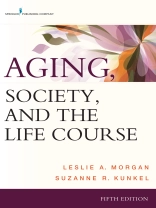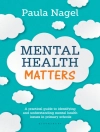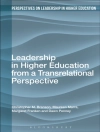'[This] book’s unfading preoccupation with social context, social processes, and social structures distinguishes itself and greatly contributes to the discourse in gerontology.’
-The Gerontologist
This classic text, now in its fifth edition, is distinguished by its emphasis on social context, social processes, and social structures as part of a broader understanding of the sociology of aging and the life course. Presenting an objective view of the realities of aging, both positive and negative, the book examines aging from micro/macro, personal, community, societal, and global perspectives. This fifth edition describes important changes in the field of social gerontology and the growth in such topics as diversity, global aging, and the life course. It addresses major shifts in public policy, social institutions, and aging-related programming initiatives. There is a strong focus on the changing landscape of aging, particularly in regard to social engagement, employment and lifelong learning, enhanced health and independence, and livable communities for people of all ages. Additionally, the book includes new information on the Affordable Care Act and end-of-life issues.
The text is uniquely organized, featuring theoretical discussions in each chapter and topical essays between chapters. Critical thinking and review questions foster an in-depth understanding of the material. Written in an engaging style, the text is for graduate and upper-level undergraduate students; it is also used effectively in introductory gerontology classes. In addition to an Instructor’s Manual, the fifth edition now includes Power- Point slides
>NEW TO THE FIFTH EDITION:
- Provides updated data on aging and baby boomers in the United States and worldwide
- Presents expanded focus on baby boomers’ impact on the larger society
- Discusses major public policy changes and innovative services and programs affecting older adults
- Uses detailed examples to illustrate the challenges of sorting out age, period, and cohort effects in research on aging
- Covers the Affordable Care Act and up-to-date information on Medicare
- Features new information on end-of-life issues
- Presents provocative essays on positive and contemporary issues not typically covered, including love, sex, creativity, media representations, LGBT aging, and crime
- Focuses on enhanced health and independence and aging-in-place initiatives
- Provides learning objectives in each chapter and web-based extracurricular activities
- Includes Power Point slides in addition to an Instructor’s Manual
Spis treści
Contents
Preface
Acknowledgments
1. AGING AND SOCIETY
Learning Objectives
Dimensions of Aging
Physical Aging
Psychological Aging
Social Aging
Societal Aging
Ways of Categorizing People by Age
Chronological Age
Functional Age
Life Stage
The Rise of Old Age as a Social Category
Generational Consciousness
The Aging Population as a Social Force
The Life Course and Old Age
Social Perspectives on Aging
The Sociological Imagination
The Growth of Gerontology as a Field of Study and Practice
Summary
Web Exercise
Key Terms
Questions for Thought and Discussion
2. STUDYING AGING
Learning Objectives
Why Do We Conduct Research?
The Role of Theory
How Do We Conduct Research on Aging?
Age as a Variable
Separating Age, Period, and Cohort Effects
Methods Targeted to Research on Aging
Longitudinal/Panel Studies
Secondary Analysis
Qualitative, Quantitative, and Mixed Methods
Event History Analysis
Life History and Reminiscence
Other Special Issues in Studying Aging
Cohort-Centrism, Dynamism, and Limits of Current Knowledge
Applying Theory: Cohort Size and Life Chances: The Easterlin Hypothesis
Sociology of Science
Research Activism
Summary
Web Exercise
Key Terms
Questions for Thought and Discussion
TOPICAL ESSAY. IRONIES OF CRIME: SILVER-HAIRED VICTIMS AND CRIMINALS
3. AN AGING WORLD: DEMOGRAPHIC PERSPECTIVES
Learning Objectives
The Aging of Societies
Global Aging
How Do Populations Age?
Applying Theory: Demographic Transition Theory
Measures of Population Aging
Demographic Characteristics of the U.S. Aging Population
Living Arrangements
Geographic Distribution
Gender Composition
Increasing Racial and Ethnic Diversity
Centenarians
Interpreting and Using Demographic Data
The Fallacy of the Demographic Imperative
Summary
Web Exercise
Key Terms
Questions for Thought and Discussion
4. THE AGING INDIVIDUAL IN SOCIAL CONTEXT
Learning Objectives
Setting the Stage: Psychology of Aging
Human Development and Aging
Social Context, Life Course, and Individual Aging
Successful Aging: The Role of Social Factors
Environmental Gerontology
Social Context
The Life Course
Social Roles
Age Norms
Structural Lag
Life Course Perspective in Gerontology
Analyzing Theory: The Emergence of Developmental Science
Summary
Web Exercise
Key Terms
Questions for Thought and Discussion
TOPICAL ESSAY. CREATIVITY AND AGE: THE REAL STORY
5. AGING AND THE FAMILY: PERSONAL AND INSTITUTIONAL CONTEXTS
Learning Objectives
The Family as an Institution
The Meanings of Generation
Core Norms and Expectations of Family Relationships
Independence and Dependence
Voluntarism and Obligation
Families as Personal Networks
Applying Theory: Family Life Cycle Theory and Individual Dependency in the Family
Strengths in Later-Life Families
Continuity and Change in Later-Life Families
Key Familial Roles and Relationships
Spouses/Aging Couples
Grandparents
Families as Caregivers
Context of Caregiving: Family Norms of Mutual Assistance
Intergenerational Support
Family Members as Caregivers to Frail Elders
Caregiver Burden and Rewards
Involvement of Older Adults in Their Own Care
Family Conflict: Elder Abuse and Neglect
Social Change and the Family’s Future
Changes in Marriage
Changes in the Size and Shape of Families
Future Changes in the Timing of Family Life Events
Growing Complexity of Family Relations
Summary
Web Exercise
Key Terms
Questions for Thought and Discussion
6. WORK AND RETIREMENT IN THE LIFE COURSE
Learning Objectives
Employment as an Organizing Force in the Life Course
Dynamics of the Labor Force
Employment and Life Chances
The Occupational Life Cycle
Older Workers and the Dynamics of the Labor Force
Skills and Employability of Older Workers
Age Discrimination in Employment: Problems and Policies
Applying Theory: Rocking Chairs or Rock Climbing: Disengagement and Activity Theories
Defining Retirement
The Social Construction of Retirement
The Institutionalization of Retirement in the United States
The Role of Social Security
The Role of Employer Pensions
Gender and Retirement
Race, Ethnic, and Social Class Variations
The Deconstruction of Retirement?
Individual Retirement
Determinants of the Retirement Decision
Employment After Retirement—Encore and Bridge Jobs
Retirement Consequences for Individuals and Couples
Applying Theory: Continuity Theory and the “Busy Ethic”
Rethinking Work and Retirement for the Future
Changes in Policies and Political Attitudes
Changes in the Economy and the Nature of Work
Summary
Web Exercise
Key Terms
Questions for Thought and Discussion
TOPICAL ESSAY. PORTRAYAL OF OLDER MEN AND WOMEN IN MEDIA
Senjooti Roy
7. ECONOMICS AND THE AGING OF SOCIETY
Learning Objectives
The Role of Economics in Aging
Policy and the Economic Status of Older Adults
Sources of Income for Older Adults in the United States
Economic Well-Being of Older Americans
Economic Well-Being and Inequality Among Older People
Effects of Population Aging on the Economy
Applying Theory: The Stratified Life Course: Cumulative Inequality and Economic Diversity
Prospects for the Future Economic Status of the Elderly
Summary
Web Exercise
Key Terms
Questions for Thought and Discussion
TOPICAL ESSAY. E-ELDERS
8. AGING AND HEALTH: INDIVIDUALS, INSTITUTIONS, AND POLICIES
Learning Objectives
Physical Aging
The Health Status of Older People
Prevalence Rates for Chronic Conditions
Functional Ability
Self-Assessment
Mortality
Mental Health and Aging
Explaining Gender and Race Variations in Health
The U.S. Health Care System
The Medical Model of Health Care
Elements of the Health Care System
Access and Utilization
Financing Health Care for Older Americans
Applying Theory: The Political Economy of Health Care Access
Long-Term Care in the United States
Summary
Web Exercise
Key Terms
Questions for Thought and Discussion
TOPICAL ESSAY. ANTIAGING: COSMETICS AND AESTHETICS
Senjooti Roy
9. POLITICS, GOVERNMENT, AND AGING IN AMERICA
Learning Objectives
The Social Construction of Old Age and the Welfare State
The Older Americans Act: A Legacy of Compassionate Ageism
Policy Debates and the Social Construction of Old Age
Generational Politics: Conflict and Consensus
The Potential for Generational Conflict
The Generational Equity Debate
The Battle Over Social Security
The Debate on Age and Need Entitlements
Rethinking Age-Based Policies?
Aging and Political Behavior
Age Norms and Rules for Political Participation
Age, Period, and Cohort Effects on Political Behavior
Working the Political System: Age-Based Advocacy
Applying Theory: Age Stratification Theory
Summary
Web Exercise
Key Terms
Questions for Thought and Discussion
10. GLOBAL AGING With J. SCOTT BROWN
Learning Objectives
Global Aging and Regional Economies
Level-of-Development Designations
Demographic Overview of Global Aging
Speed of Population Aging
Demographic Dividends
Cultural Traditions, Population Aging, and Social Change
China: One-Child Policy
Germany: Inverted Pyramid
Kenya: Health Challenges
Aging and the Welfare State
History of the Welfare State
Program Types and Eligibility
Welfare State and the Role of the Family
Applying Theory: Modernization Theory
The Study of Global Aging
Comparative Methods
International Initiatives on Aging
Summary
Web Exercise
Key Terms
Questions for Thought and Discussion
TOPICAL ESSAY. GREYING OF THE RAINBOW: LGBT AGING
Colleen R. Bennett
11. BABY BOOMERS AND THE CHANGING LANDSCAPE OF AGING
Learning Objectives
Cohort Flow and Changing Aging
Who Are the Baby Boomers?
Characteristics of the Baby Boomer Cohort
Generational Characteristics
New Landscapes of Aging
The Third Age: A New Phase of the Life Course
Productive Aging: Expanded Opportunities, Altered Expectations
Workforce Needs for an Aging Society
Lifelong Learning
Summary
Web Exercise
Key Terms
Questions for Thought and Discussion
12. THE DYNAMICS OF AGING IN OUR FUTURE
Learning Objectives
Aging in a Changing Social World
Rethinking Old Age and the Life Course
Long-Term Changes in Aging: Beyond the Boomers
Growth and Change: The Aging of the Older Population
Centenarians
Changing Family Structures: Implications for Care and Relationships
Changes in Health: Incremental Changes and Breakthroughs
The Risks of Prediction
The Uniqueness of Aging in Each Cohort
Challenges and Opportunities for the Field
Disciplinary Frameworks
Micro/Macro Distinctions: Implications for Policy and Practice
Firming our Theoretical Foundations
Addressing Diversity
Transforming Knowledge to Inform Policy and Practice
Your Future Aging Self
Summary
Web Exercise
Key Terms
Questions for Thought and Discussion
References
Index
O autorze
Suzanne Kunkel, Ph D, is University Distinguished Professor of Gerontology and Executive Director of the Scripps Gerontology Center at Miami University. Her research is broadly focused on the social determinants of health, including the system of programs and services designed to support older adults in their goals to remain healthy, active, and engaged in their communities for as long as they choose. She has been supported by more than $7.5 million in external research funding to assess the implementation and effectiveness of these programs, including innovations such as consumer self-direction and dementia-friendly communities, and the role of cross-sectoral organizational partnerships in enhancing population health. Dr. Kunkel has published widely on the results of these projects, and on gerontology education. With Frank Whittington and Kate de Medeiros, she authored the second edition of Global Aging: Comparative Perspectives on Aging and the Life Course, a Springer textbook released in 2020. Kunkel is a Fellow of the Gerontological Society of America (GSA) and the Association for Gerontology in Higher Education (AGHE); she has served as President of AGHE, and Treasurer of GSA. She is the recipient of the Clark Tibbitts Award for contributions to the advancement of gerontology as a field of study.












